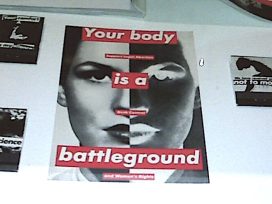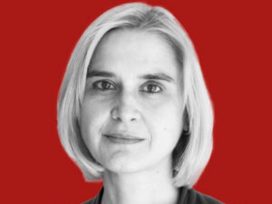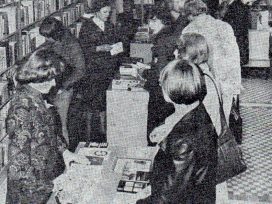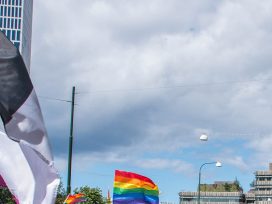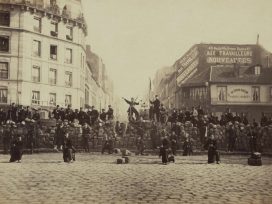Priyanka Hutschenreiter (PH): How is Krytyka Polityczna structured? What kinds of projects has Krytyka Polityczna historically worked on and what kinds of projects are you focusing on today?
Agnieszka Wiśniewska (AW): Krytyka Polityczna now is a network of institutions. We have an overarching institution and inside this institution we have an online daily opinion magazine. We also run a publishing house, so we publish original books on history, sociology, economy and many other social issues, we also translate books. We also run a research institute where we do the research and we try to understand what is happening in Polish society. We also run two social cultural centres, one in Warsaw and one in Cieszyn. These institutions represent different forms of talking and trying to understand what is happening politically, socially and culturally in Poland.
We strongly believe that if you want to change the world, the enacted change needs to be more fair, more progressive, better for everyone, not for just the few. And to change the world we need to understand what is happening and to understand this, we need to have research, we need to try to find some answers in different kinds of publishing.
When we publish a book, we can start some kind of discussion and develop deeper understandings of specific questions. That’s why we run an online magazine where we can react faster to what is happening presently. But this is not a news magazine, this is an analytical opinion magazine. Together, I call this Krytyka’s universe. The books, events, workshops, online pieces like the op-eds, online magazines, these are different forms through which we are trying to understand what is happening around us.
Krytyka Polityczna is now 23 years old. We started in 2002 and we started with a printed quarterly magazine. Then around the magazine, people started to meet and discuss. So we rented some space to have a place for meetings. We started a formal institutional association because Krytyka Polityczna is run by a non-governmental organisation association. We then realised that a magazine wasn’t enough to provide the analyses and thought that we wanted to share. We decided that book publishing was our next route. We founded the publishing house.
Organically, we then developed a critical political network. People in different cities organised events, debates and meetings. Now many of those people have started to run their own organisations. They are in public institutions working locally across Poland and some became members of parliament. So during Krytyka’s 23 years, we also built a network of contacts with many activists, researchers, academics, actors around Poland and Europe.
Of course, the organisation is changing now because the situation around us is changing. Right now we are focusing mainly on the online magazine, the publishing house and the research institute.
PH: Krytyka engages with Polish society in many formats, but it also works on a lot of trans-European projects too. How do you go about finding funding in an increasingly difficult public funding sphere and what are your main approaches to sustaining Krytyka’s work?
AW: Krytyka is governed by an NGO. So if you run an NGO, it’s usually never sustainable. Let’s be honest. We sustain ourselves partly through funds from book sales.
We also apply for grants, of course. Each year we take part in a few international projects with partners. These are cultural projects and media projects. We prepare grant applications and we do get small-scale support from private donors like our readers. These are small donations and sometimes also regular small donations which give us opportunities to try new things. These provide enough money to have extra content, extra articles for the online magazine.
But mostly we are a typical NGO. We do lots of projects and this is also changing in the last few years. What grants we get and projects we can run depends a lot on the social situation, the international situation. Right now, we all know this year that the American funds have been cut, so we also lost some projects because of that. Sometimes because of the political situation in Poland, we don’t have any chance for support from the state. This is what happened for eight years when Law and Justice [a right-wing political party in Poland] was in power. So we need to be and we are flexible all the time. This is the challenge.
PH: Could you say more about some of the cultural and media projects you’re working on?
AW: In Come Together, we work with other media from Europe to develop sustainable business models. We are also part of the Display Europe project where we developed the Display Europe platform. This is a platform where we exchange content and where we can view media from Europe. All partners share their content and this content can be read in 15 different languages. So it also gives us an opportunity to share our content with audiences who don’t read what Krytyka Polityczna publishes in Polish. It also gives us the opportunity to check what other interesting media publish and we can translate some of their pieces on our website in Polish.
There is also a video content production network Sphera that we are a part of. We comprise about 10 partners from seven countries. We focused on video production–shorter, longer, local international video production when we focused on socio-cultural issues. Another bigger project is a collaboration with a media activist on a really interesting project through which we connected activists with the media landscape. This is something which is very close to our DNA.
Our smaller projects are focused on strengthening our institutional base. We are currently rebuilding our website, which we are launching in the next few months. The website is where we connect all of Krytyka Polityczna’s activities. There will be possibilities to subscribe, to have your own accounts, to comment, to interact with our audience. This is really important for us because what we have seen in the last years, and I think many media can see this, is that we have been connecting with our audience via social media, which are not social and not the media, but big tech platforms. They are changing their algorithms not to promote media content, but to keep audiences on their social media platforms. So we decided we need to act. That’s why we built our own ecosystem and our own platform where we can have direct contact with our audience and with the readers. Not via big tech, but via emails, newsletters, like the comments on a website, as well as physical meetings. It is important for us to organise physical meetings, sometimes workshops, sometimes discussions, where we can talk, exchange ideas and discuss.
PH: What is Krytyka Polityczna’s goal right now and for the foreseeable future?
AW: What is important for us is to look for new ideas, new ways of understanding what is happening to build connections between different worlds and communities like activists, academics, people from the cultural field, people from the media field. This is very hard. We think that these represent different ways of ideating, analysing and affecting change. We use different tools like research, culture, and activism to know more. We often say that we are not looking for simple answers, but we pose difficult questions and this is not something that will be very popular in today’s world.
Politicians in particular are very often proposing very simple answers for very complex problems. We think that this is not the way you can help the public understand what is happening around us. So it’s important to be open, to ask these difficult questions and to challenge simple answers.
This is what we are doing. That’s why we propose analyses through deeper discussions, interviews, op-eds, and books, including deep sociological research. This kind of knowledge and knowledge sharing is difficult, but it can help us to understand the world and then change it.
This interview was commissioned as part of Come Together, a project leveraging existing wisdom from community media organizations in six different countries to foster innovative approaches in global independent journalism.
